2020年高二英语外研版选修六教学案:Module 2 Section 3 含答案
- 格式:doc
- 大小:138.00 KB
- 文档页数:7
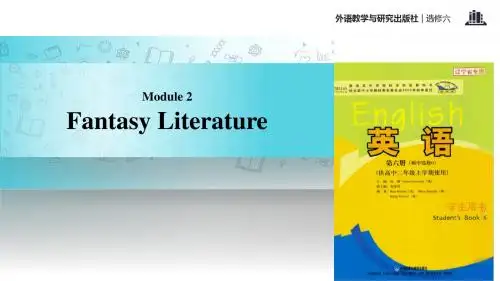
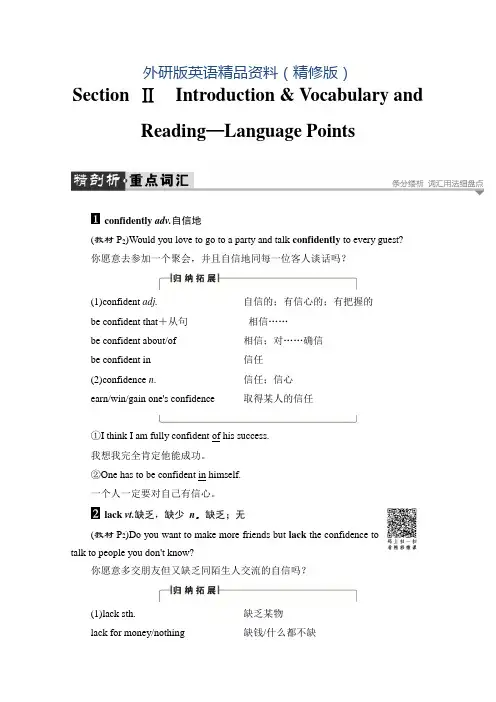
外研版英语精品资料(精修版)Section ⅡIntroduction & Vocabulary and Reading—Language Pointsconfidently adv.自信地(教材P2)Would you love to go to a party and talk confidently to every guest?你愿意去参加一个聚会,并且自信地同每一位客人谈话吗?(1)confident adj.自信的;有信心的;有把握的be confident that+从句相信……be confident about/of 相信;对……确信be confident in 信任(2)confidence n. 信任;信心earn/win/gain one's confidence 取得某人的信任①I think I am fully confident of his success.我想我完全肯定他能成功。
②One has to be confident in himself.一个人一定要对自己有信心。
lack vt.缺乏,缺少n.缺乏;无(教材P2)Do you want to make more friends but lack the confidence totalk to people you don't know?你愿意多交朋友但又缺乏同陌生人交流的自信吗?(1)lack sth. 缺乏某物lack for money/nothing 缺钱/什么都不缺(2)lack n. 缺少,缺乏the/a lack of... ……不足for lack of 因缺乏……(3)lacking adj.缺少的,缺乏的be lacking in 缺乏;没有①Lack of money is the root of all evil.缺乏金钱是万恶之源。
②He is lacking in responsibility.他缺乏责任心。
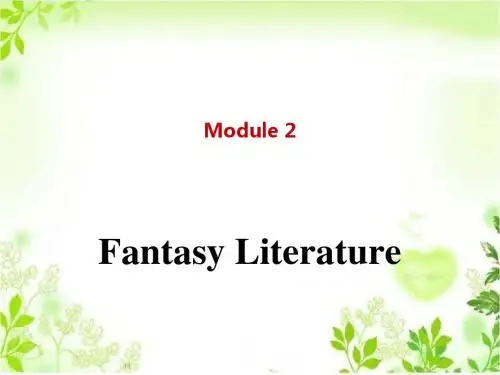
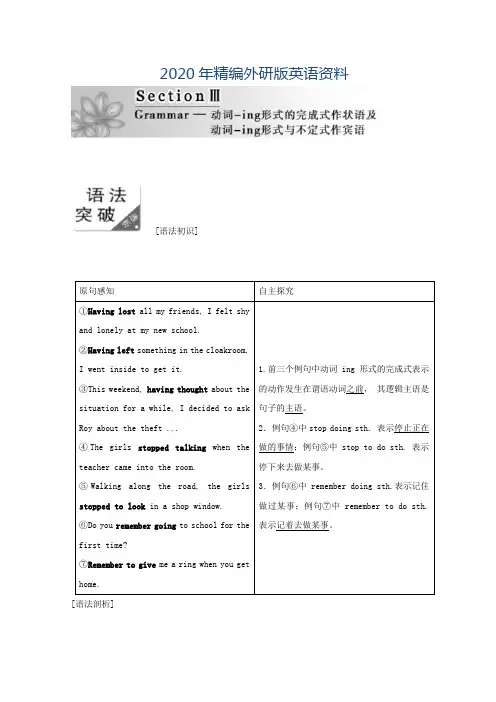
2020年精编外研版英语资料[语法初识][语法剖析]1.动词ing形式的完成式作状语的基本用法(1)基本形式:having+过去分词否定形式:not having+过去分词完成式的被动式:having been+过去分词(2)成分:动词ing形式的完成式在句中可作状语,常表示时间、原因等。
(3)功能:所表示的动作发生在谓语动作之前,如果该动作与句子的主语之间是主谓关系,则用主动形式having done;如果是动宾关系,则用被动形式having been done。
Having lived in the city for three years, she knows it well.在这个城市生活了三年,她对这里已经很熟悉了。
Not having finished the homework, the pupil doesn't dare to go to school.由于还没有完成作业,这个学生不敢去上学。
Having been invited to speak, I'll start making preparations tomorrow.已经被邀请发表讲话,我明天将开始做些准备。
2.动词ing形式的一般式和完成式作状语的用法区别(1)动词ing形式的一般式,作状语时与句子主语之间为主动关系,所表示的动作与句子谓语动作同时或几乎同时发生,常表示时间、条件、原因或结果等。
Seeing those pictures, he couldn't help thinking of those days in Yan'an.当他看到那些图片时,就禁不住想起了在延安的那些日子。
Working hard, you will pass the entrance exam.如果你努力学习,你就会通过入学考试。
(2)动词ing形式的完成式,作状语时与句子主语为主动或被动关系,所表示的动作发生在谓语动作之前,常表示时间或原因等。
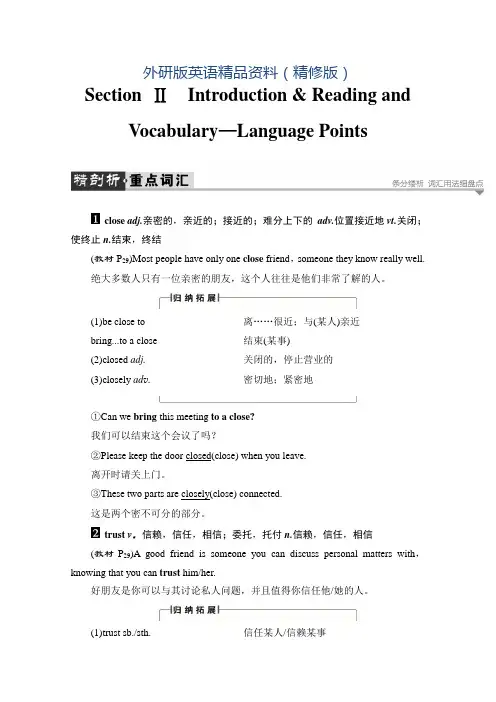
外研版英语精品资料(精修版)Section ⅡIntroduction & Reading and Vocabulary—Language Pointsclose adj.亲密的,亲近的;接近的;难分上下的adv.位置接近地vt.关闭;使终止n.结束,终结(教材P29)Most people have only one close friend,someone they know really well.绝大多数人只有一位亲密的朋友,这个人往往是他们非常了解的人。
(1)be close to 离……很近;与(某人)亲近bring...to a close 结束(某事)(2)closed adj.关闭的,停止营业的(3)closely ad v.密切地;紧密地①Can we bring this meeting to a close?我们可以结束这个会议了吗?②Please keep the door closed(close) when you leave.离开时请关上门。
③These two parts are closely(close) connected.这是两个密不可分的部分。
trust v.信赖,信任,相信;委托,托付n.信赖,信任,相信(教材P29)A good friend is someone you can discuss personal matters with,knowing that you can trust him/her.好朋友是你可以与其讨论私人问题,并且值得你信任他/她的人。
(1)trust sb./sth. 信任某人/信赖某事trust sb.to do sth. 放心让/信任某人做某事(2)have/put/place trust in sb./sth. 信任某人/信赖某事①A good marriage is based on trust.美满的婚姻是建立在互相信任的基础上的。
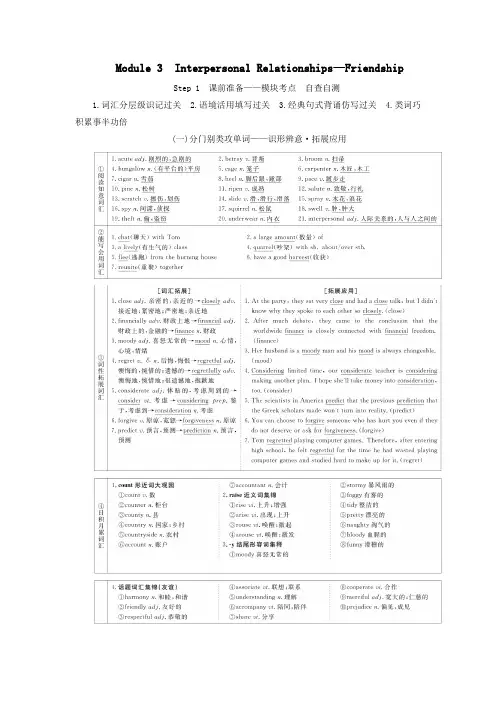
Module 3 Interpersonal Relationships—FriendshipStep 1 课前准备——模块考点自查自测1.词汇分层级识记过关2.语境活用填写过关3.经典句式背诵仿写过关4.类词巧积累事半功倍(一)分门别类攻单词——识形辨意·拓展应用(二)写用结合记短语——译写短语·语境活用(三)仿写活用练句式——经典句型·仿写背诵Step 2 课堂探究——核心考点点点突破1.重点难点考点学通练透2.归纳总结拓展开阔视野3.方法规律技巧权威点拨4.面面俱到打创高效课堂第一时段Introduction, Reading And Vocabulary 1.mention v. & n.提到,涉及;说起[教材原句] You mentioned that you would like to teach English in return, which is exactly what I am dying for.你提到你想教英语作为回报,这正是我所渴望得到的。
(1)mention doing sth. 提到做某事⎪⎪⎪mention sth. to sb.mention to sb. that...向某人提及…… (2)not to mention =without mentioning更不必说,更谈不上Don't mention it. 不要客气/不用谢/没关系。
make (no) mention of (没)提及,(没)提到单句语法填空①In the interview, the singer mentioned her childhood ________ the journalist. ②I hear they've promoted Tom, but he didn't mention ____________ (promote) when we talked on the phone.补全句子③He has two big houses in this country, ________________his villa in France. 且不说在法国有别野外,他在这个国家还拥有两栋大房子。

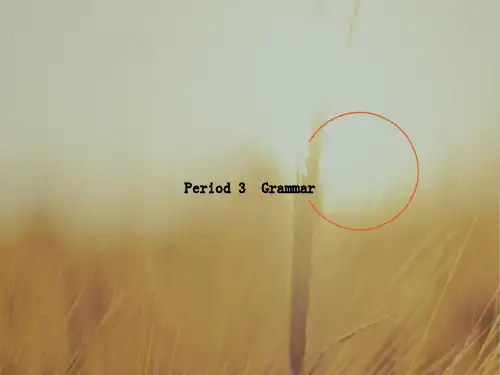
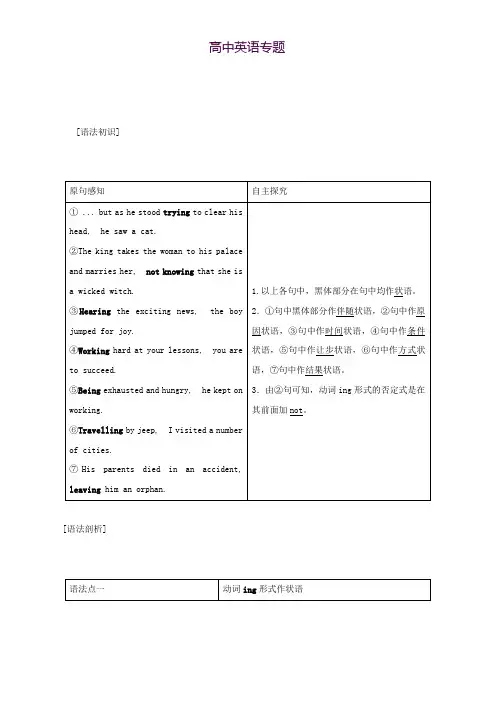
[语法初识][语法剖析]1.作时间状语时,相当于一个时间状语从句。
其前面可加when, while 或before等词。
Putting on his clothes, Bill went out in a hurry.穿上衣服后,比尔匆忙离开了。
While waiting at the dentist's, I read a short story.在牙医诊所候诊时我读了一篇短篇小说。
2.作条件状语时,相当于一个条件状语从句。
Reading carefully, you'll learn something new.=If you read carefully, you'll learn something new.仔细读,你就会学到新东西。
3.作原因状语时,一般可改写成as或because引导的原因状语从句。
Being tired, he couldn't walk any further.=As he was tired, he couldn't walk any further.由于累,他再也走不动了。
4.作让步状语时,其前可加上although, though, even if/though等词。
Knowing all this, they made me pay for the damage.尽管知道了一切情况,他们还是要我赔偿损失。
Having failed many times, he didn't lose heart.尽管失败了许多次,他没有灰心。
5.作结果状语时,其前可加thereby, thus, therefore等词。
The book sold more than 500,000 copies a year, making it one of the bestsellers at that time.那本书一年销售五十多万册,使它成为当时的畅销书之一。
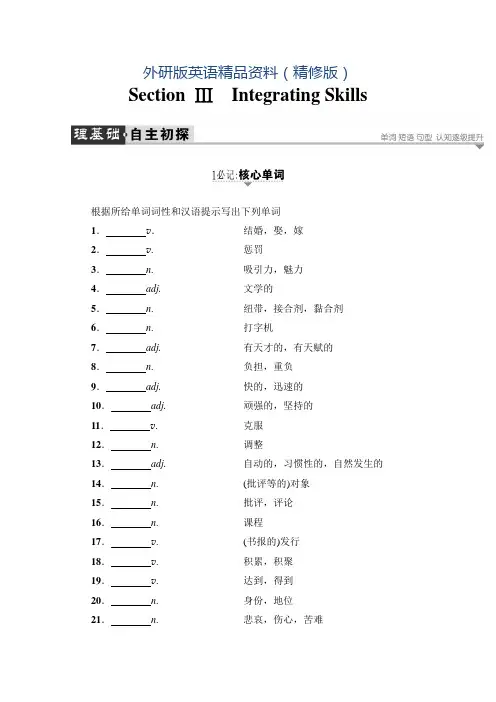
外研版英语精品资料(精修版)Section ⅢIntegrating Skills根据所给单词词性和汉语提示写出下列单词1.v.结婚,娶,嫁2.v. 惩罚3.n. 吸引力,魅力4.adj.文学的5.n. 纽带,接合剂,黏合剂6.n. 打字机7.adj.有天才的,有天赋的8.n. 负担,重负9.adj.快的,迅速的10.adj.顽强的,坚持的11.v. 克服12.n. 调整13.adj.自动的,习惯性的,自然发生的14.n. (批评等的)对象15.n. 批评,评论16.n. 课程17.v. (书报的)发行18.v. 积累,积聚19.v. 达到,得到20.n. 身份,地位21.n. 悲哀,伤心,苦难22.adj.魔法的;不可思议的23.n. 力量,能力24.v. 拥有【答案】 1.marry 2.punish 3.appeal 4.literary 5.bond 6.typewriter 7.gifted8.burden 9.swift10.stubborn11.overcome12.adjustment 13.automatic14.target15.criticism 16.curriculum17.distribute18.accumulate 19.attain20.status21.sorrow22.magical 23.power24.possess根据提示补全下列短语1.(be)associated 与……有联系;与……联系在一起2.appeal sb. 对某人有吸引力,引起某人的兴趣3.(be)restricted 限于4.ahead 在……前面5.look back one's shoulder 回头看6.catch a of 瞥见7.set 出发,动身8.to 应该【答案】 1.with 2.to 3.to 4.of 5.over 6.glimpse7.out8.ought根据提示补全下列教材原句【导学号:38300009】1.,the king immediately falls in love with her.一见到她,国王就爱上了她。
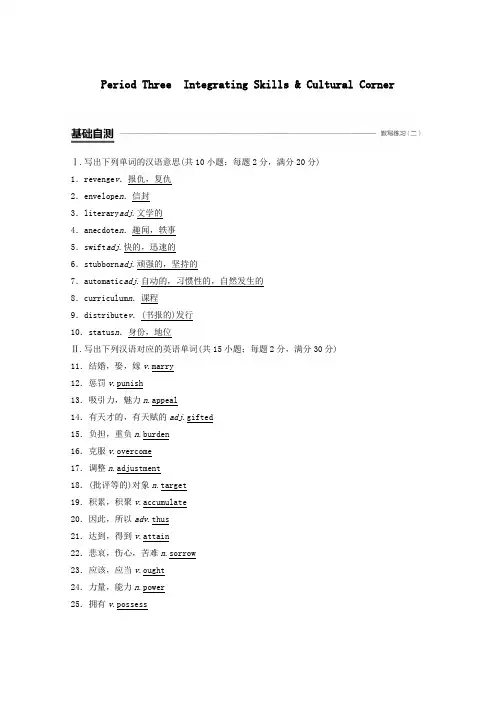
Period Three Integrating Skills & Cultural CornerⅠ.写出下列单词的汉语意思(共10小题;每题2分,满分20分)1.revenge v.报仇,复仇2.envelope n.信封3.literary adj.文学的4.anecdote n.趣闻,轶事5.swift adj.快的,迅速的6.stubborn adj.顽强的,坚持的7.automatic adj.自动的,习惯性的,自然发生的8.curriculum n.课程9.distribute v.(书报的)发行10.status n.身份,地位Ⅱ.写出下列汉语对应的英语单词(共15小题;每题2分,满分30分)11.结婚,娶,嫁v.marry12.惩罚v.punish13.吸引力,魅力n.appeal14.有天才的,有天赋的adj.gifted15.负担,重负n.burden16.克服v.overcome17.调整n.adjustment18.(批评等的)对象n.target19.积累,积聚v.accumulate20.因此,所以adv.thus21.达到,得到v.attain22.悲哀,伤心,苦难n.sorrow23.应该,应当v.ought24.力量,能力n.power25.拥有v.possessⅢ.写出下列短语或短语对应的汉语意思(共10小题;每题2分,满分20分)26.在……前面aheadof27.回头看lookbackoverone’sshoulder28.瞥见catchaglimpseof29.出发,动身setout30.以便;为了soasto31.发生takeplace32.putaspellon用咒符镇住33.(be) associatedwith与……有联系,与……联系在一起34.appealtosb.对某人有吸引力,引起某人的兴趣35.(be) restrictedto限于Ⅳ.完成句子(共5小题;每题6分,满分30分)36....becauseshewastoopoortoownatypewriter,shewrotebyhand.……由于贫穷,买不起打字机,她只好手写书稿。
高二英语选修6模块2语言点教案外研版选修6 模块2 语言点讲解1.She came out of a garden to where Will was standing.她从花园出来,来到威尔站立的地方。
句中where引导的是介词的宾语从句。
例如:Our success depends upon how well we can cooperate with one another.2.Still watching,Will saw the cat behave strangely. 威尔定睛看过去,看见那只猫行为怪异。
Still watching是现在分词短语作状语,表示伴随。
分词做状语时,它的逻辑主语与句子的主语一致,作状语的分词相当于一个状语从句。
例如:Hearing the news, they all jumped with joy. Using what you know of word stems and word formations, you can make a guess at the meaning of a new word. The students went out of the classroom, laughing and talking.3.Then she leapt back,with her tail held up.然后她向后跳了跳,尾巴翘的老高。
句中with引导的with独立主格结构。
结构一:with +名词(代词)+介词短语,He sat there thinking, with his chin on his hand.他手托下巴,坐在那儿沉思。
结构二:with +名词(代词)+形容词,He stared at his friend with his mouth wide open.他张大嘴巴凝视着他的朋友。
结构三:with +名词(代词)+副词,With production up by 60%, the company has had another excellent year.产量上升了60%, 公司又是一个好年景。
The Story of J.K. Rowling and Harry Potter Teaching Aims1.Knowledge Objects1) The Ss can understand the text and master the useful words and expressions.2) The Ss can use skimming, scanning and intensive skills to complete tasks3) The Ss can use the related words and phrases to express their thoughts in theproper situation.2. Ability Objects1) To improve the Ss’ reading ability.2) To develop the Ss’ abilities of listening, speaking and writing.3) To train the Ss’ ability of working in groups.3. Emotion and Moral Objects1) By completing the task, the Ss increase their interest in fantasy literature.2) By reading the story of J. K. Rowling, Ss should know how to face difficulties. Teaching important point:How to understand the text better.Teaching difficult points:1. Understand some difficult sentence2. Discuss how to face difficultiesTeaching methods:Question-and-answer activity teaching methodWatch-and-listen activity teaching methodFree discussion methodPair work or individual work methodTeaching ProceduresStep I Lead-in and checking(Purpose: arouse Ss’ interest and check the preview)1.Lead-in:Show two pictures on the screen,ask Ss:1)Do you know the boy in the pictures?2)what do you know about him?2. check the preview :Do T&F1)Harry Potter had an unhappy childhood.2)The train to Hogwart’s leaves from a magic platform.3)Quidditch is another name for football.4)Voldermort is a bad person.5)Harry is the same age in all books.6)Each Harry Potter book is like a new chapter in the long adventure for Harry.3. Show Pictures of Seven books1)how much do you know about the author of Harry Potter?2)Do you want to know more about the great writer, J. K. Rowling ?Step II Reading(Purpose: train Ss’ reading ability)1. Prediction before Reading:According to the title and the picture, can you predict what style the passage is?A NarrativeB ArgumentativeC Fancy2. Skimming and scanningMatch the main ideas with the paragraphs.Para.1 a. She met some difficulties while writing.Para.2 b. She overcame the difficulties and published the first book.Para.3 c. Rowling, Harry’s creator came up w ith the ideaPara.4 d. The books appeal to readers of all ages.Para.5 e. The effect of the books are great.Para.6 f. It took her ten years to complete the successful books.3. Intensive readingPara 1 (Listen to the tape)1. Where did the idea for Harry Potter come from?2. Where did she add flesh to the bones of the first Harry Potter story?3. Where did she develop the whole series?Para 2--- 31. What difficulties did she meet when she began to write the first story?2. What was Rowling's attitude to difficulties?↓3. What should we do when we meet difficulties? (Discussion)4. Difficult SentencesIt was only in 1997 that she completed the first Harry Potter story, which, because the publishers in the USA requested an adjustment to the title, was also known as Harry Potter and the Sorcerer’s Stone.Translation:___________________________________________________________ Sentence Structure: It was…. That which becausePara 4As soon as the first book was a success, _____A J.k.Rowling finished the series more quickly than plannedB the publishers asked her to finish one book a yearC she wrote The Order of the PhoenixD it was clear that the others would be successful too.Para 5 ( look at the video)Harry Potter stories are so appealing that they____A must be included in the school curriculumB are shown on television in other countriesC encourage children to read moreD have been criticised for bad stylePara 6 Find out the numbers.55 250 million 1 billionStep III SummaryThe idea for Harry Potter ____ ___ her when she was on a delayed train.She met many difficulties at the beginning but ________ was not swift. She was_________ and ___________all the difficulties.The books become so popular and they ______ ___readers of all ages. The books have been _________ ____ 55 languages. She has thus became a________.Divide the passage into 3 parts according to the main ideas.Part 1(para____---____) Coming up with the ideaPart 2(para____---____) Meeting difficultiesPart 3 (para___---_____) Achieving SuccessStepIV Show Time(Purpose: Migrate the knowledge and improve their oral English)Suppose you are the reporter of the school newspaper, Rowling is in Pingyao now. Take the chance to interview her. You want to know the following things.Nationality(籍贯), works(作品), creation background, the present situation, planStepV Homework(Purpose: Migrate the knowledge and improve their writing ability)Show two books to Ss.Make Ss choose one and write a passage about the story of the writer and the book. Contents:Nationality, works, creation background, the book’s effect……Useful expressions:The idea for…..came to sb when …add flash to the bonesThere are many anecdotes about….What makes the book important is that…The book’s effect is…Blackboard DesignThe Story of J.K. Rowling and Harry PotterPart 1(para____---____) Coming up with the ideaadd flash to the bonesPart 2(para____---____) Meeting difficultiesPart 3 (para___---_____) Achieving SuccessTeaching Reflection。
外研版高中英语选修6教案篇一:高二英语外研版选修六Module 6 整个单元教案富县高级中学集体备课教案1附注:课型填“常规课”或“复习课”或“习题课”或“多媒体课”。
2富县高级中学集体备课教案345篇二:高二英语外研版选修6 Module 4教案Module 4MusicContent: IntroductionTeaching aims and teaching demands:1 Have the students know some Chinese and western instruments.2 Have the students know some knowledge about music.3 To train the students’speaking skills and listening skills through making dialogues.4 To train the students how to improve their oral English. Important and difficult points:1 How to master the names of different instruments.2 How to distinguish the Chinese and western instruments.3 How to make the students perform themselves in class and make dialogues with others in English.4 The knowledge of music and development of the students’oral English and the skills of communication. Teaching style: warming-upTeaching methods: elicitation and discussion.Teaching instruments: computer, blackboard, and lantern slide.Teaching procedures:Step I : Lead-in.? Teacher: Thank you for your sing!? Do you like singing in your spare time?? How do you feel when you finish listening to a song or singing a song?? Which subject do we study from how to sing?? Is sing equal to music?Notes: The teacher directs the students to begin this topic through their answers---singing.T: In this module, we will discuss something about music together.Step II: Warming-up..1: T: How much do you know about the world of music? 2: Ss: There are the types of music, composer, band, singers, choir, instruments and so on.3: T: What do the types of music have?4: Ss: pop music, folk music, rock music, classical music, rap music, and jazz music.Step III: The discussion about instruments.1 T: Please discuss the question with other students.①How many of the Chinese instruments and western instruments have you heard?Two minutes!2 Ss: The names of different instruments.3 T: Let’s enjoy beautiful pictures about instruments to know them detailedly.Notes: The teachers first shows different pictures about the instruments and then have the students answer what it is. If some instruments are not known by the students, the teacherwill gives information about them for the students.4 Instruments include: erhu, drum, flute, vertical bamboo flute, piano, electronic organ, saxophone, konghou and harp, guzheng, dulcimer, violin, guitar, cello, lute, pipa, mandolin, and yueqin.StepⅣ: Introduction.1 T: Have the students complete activity 1.Look at the photos of Chinese and western musical instruments and answer the questions.2 Check the answers:①All of them have strings②The pipa and the lute, the konghou and harp③The pipa, lute, yueqin, and mandolin.Notes: When the students answer the questions, the teacher needs to refer to the other instrumentswhich the students enjoyed just now.StepⅤ: Discussion.1 T: Give three questions to the students.?????? (1) How much information do you know about the artists Langlang and Twelve Girls Band? (2) Do you know any Chinese classical music pieces which feature these instruments? Eg; Liangzhu. (3) Which type of music do you like best, and why? Notes: If the students may not know them in detail, they can ask their music teacher or surf the Internet after class. Five minutes. Notes: some information bout Langlang and Twelve Girls Band: Langlang: pianist king , he was born in Shenyang city and began to study piano at the age of 3.He is the first Chinese pianist who played the piano in the White House. On 8th in August in 2008, he played the piano in the 29th Olympics in China. We are all proud of him, because we are all Chinese.? Twelve Girls Band is already one of China’s most popular groups. It is made up of a dozenbeautiful women who are among the most gifted musicians in the world. They perform on traditional Chinese instruments such as the Guzheng, the pipa and so on. Having received classical training, those twelve girls have built a musical bridge between east and west and charmedthe people of many nations around. The group shows a genuine love for all styles of music, which makes them well received all over the world.?????????? 2 Students’performances. Step Ⅵ: Homework. 1 Review the instruments which we knew in this class. 2 Prepare for the reading and vocabulary. Thank you for your cooperation! Best wishes for you ! Have a wonderful time in your life! Happiness will never leave you!篇三:【教材全解】2014-2015学年高中英语外研版选修六教案:M6 Period 6Period 6 Workbook.Task.Module File Teaching Goals:1.To deal with the exercises in the Workbook.2.To enable Ss to make a conclusion of thismodule.Teaching Procedures:Step 1.Revision Purpose:To deal with the exercises in the Workbook.First,check Ss whether they have finished the exercises in the Workbook.And then give some instruction of the exercises.Step 2.TaskPurpose:To help Ss to express their opinions about war.Ask Ss to write down their opinions about war on the blackboard.Step 3.Module FilePurpose:To enable Ss to make a conclusion of this module and to deepen what we have learned in the module.Ask Ss to look at Module File and try to recall what they have learnt.Then tick the things they are sure that they know and put a question mark next to the points they are not sure of and a cross to what they don’t know.Help Ss to share their ideas and deal with the difficult or confusing points.Step 4.Assessment1.Individual work for self-assessmentT:In this module.you have learnt something about War and peace.HowReflectionI learnt_________1 would like to know about _________ I’m still not sureabout __________ I’m confused about________________ 2.Group work- 1 -- 2 -篇四:高二英语外研版选修6 module 1 small talk教案Module1 Small TalkWords and expressions1. lack v 缺乏,没有The problem is which companies lack the latest equipment. They sitill lack experience\ confidence.lack n 缺乏,不足There has been a great lack of water in this summer. There is a lack of modern equipment here; I shall have to go to Guangzhou to briing some in.Phrases:lacking adj 缺乏的,不足的be lacking in 缺少----,没有----for\ through lack of 因缺乏---2. advanceadj 预先的,在前的,事先的Please give us advance warning of any changes to the schedule.vtadvance a suggestion 提出,建议advance prices 提高(价格),提升(某人)The teacher has done his best to ~the students’interest in English.(促进)The date of the meeting was advanced by 4 days.(将----提前)vi 前进;取得进展;被提升;物价等上涨,增加~ agains\ on\ upon the enemy 向敌人前进~ in skills 在技巧方面取得提高He advanced rapidly in his job.使升迁,被晋升~ in ages 年岁大起来n.they have made great advances. 进步Nothing could stop the advance of the soldiers.前进I was given an advance of a month’s pay. 预付advanced adj 高级的,先进的,高等的in advance 预先,事先pay in advancein advance of 在-----前面,超前3. think of想起,回想起We often think of you.This made us think of our days in the army.考虑,认为(think of sb\sth ------ as sth)They’re thinking of\ about buying a new car.What do you think of\ about the film?phrases.think about思索考虑think out仔细考虑盘算think over 仔细考虑think to oneself 心中想think up想出,发明think twice 再三考虑So far this is the best way I’ve thought of ________ this problem. (to settle)4. look away (from) 把目光从------移开,把脸转过去She looked away in embarrassment.The sunlight on the water was so dazzling that people had to look away.phraseslook intolook after look down upoon look throughlook up look out5. in addition 此外,并且;做副词使用,其后不接其他成分in additon to 除了---之外(还)做介词使用,后接名词或代词做宾语My mother gave me sandwiches for my lunch and a bag of milk in addition.In addition to English, he has studied a second foreign language.6. find out了解,认识到We became so interested in her story that we decided to find out more about her.We should find out what the masses think .找出,查明,弄清楚I must ring them up and find out if Xiao Wu is there.They have to find out how to bring about improvement. 7. opportunity 机会,良机make an (the) opportunity of doing (或to do) 创造做某事的机会at \ on the first ~ 一有机会就---have little(no, not much, an ) 很少有,没有,有不多的,有机会做某事in search of new opportunities 寻求新的机会I take this opportunity oof thanking you.8. applicationn.申请,申请书,请求They accepted my application to join the club.Please complete this job application form carefully.应用,运用,涂抹,敷用The application of new scientific discoveries to industrial production usually improves efficiency. 把新的科学发现运用到工业生产当中,通常可以提高效率。
Period 3: Speaking—Telling the story of The CatThat VanishedObjectivesTo learn to put written passage into a dialogue●Procedures▇ Retelling the story in your own wordsHello, class. This time we shall try to retell the story we have just read in our own words.A: Have you seen the film called The Cat That vanished?B: No, I haven’t. Tell me about it in English.A: The film begins at one night when there was very little traffic.B: It’s terrible.A: And the road where a man was standing was quiet,with comfortable houses,and trees along both sides of the road.B: What is the name of the man?A: He is Will by name.B: How was Will then?A: He was so tired that he could not think clearly but as he stood trying to decide what to do,he saw a cat.B: A cat? What a strange thing to be seen at night!A: She came out of a garden to where Will was standing. Will held out his hand, and the cat came up to him. Then she turned away and went across the road,towards the bushes just past the trees,and there she stopped.■Reading and retelling a fantasy storyYou have done a very good job. Now read another short fantasy story entitled The Price of Power by Benjamin Anible, aged 13, Houghton, Michigan. And then try to retell it in your own words.。
姓名,年级:时间:Ⅰ。
单词拼写根据汉语或首字母提示,写出下列单词1.There were balloons of all shapes(形状) and sizes in the sky.2.The soil was washed away by the flood, exposing bare(光秃秃的) rocks.3.Bitten(咬,咬伤) by a dog, the little boy did not dare to play with dogs again。
4.When I walked in, I found that he was bending(弯腰,屈身) over his desk to have a rest。
5.I have some doubt whether he is the best man for the job.6.To watch over the sick baby, the mother remained awake all the night.7.A fire broke out in their school, and it caused much alarm.8.Many people throughout history have dreamed of a world without war.Ⅱ。
拓展词汇根据词性和汉语提示,写出下列单词1.behave v.表现,举动→behaviour n.举止,行为2.hesitate v.犹豫,迟疑→hesitation n.犹豫,迟疑3.direct v.指导,指引→direction n.方向4.long v.渴望→longing n.渴望5.rough adj。
粗略的;粗糙的→roughly adv。
大概地,粗略地错误!根据提示补全下列短语1.play an important part in 在……中起重要作用2.put down 放下3.hold out 伸出4.come up to 朝……走过来5.turn away 走开6.sweep over 向……扩展7.keep one’s eyes on 注视,盯着看8.fix on 注视,凝视9.cast about 寻找,搜索,想办法10.look around for 四处寻找Ⅳ。
2020年精编外研版英语资料[语法初识][语法剖析]1.作时间状语时,相当于一个时间状语从句。
其前面可加when, while 或before等词。
Putting on his clothes, Bill went out in a hurry.穿上衣服后,比尔匆忙离开了。
While waiting at the dentist's, I read a short story.在牙医诊所候诊时我读了一篇短篇小说。
2.作条件状语时,相当于一个条件状语从句。
Reading carefully, you'll learn something new.=If you read carefully, you'll learn something new.仔细读,你就会学到新东西。
3.作原因状语时,一般可改写成as或because引导的原因状语从句。
Being tired, he couldn't walk any further.=As he was tired, he couldn't walk any further.由于累,他再也走不动了。
4.作让步状语时,其前可加上although, though, even if/though等词。
Knowing all this, they made me pay for the damage.尽管知道了一切情况,他们还是要我赔偿损失。
Having failed many times, he didn't lose heart.尽管失败了许多次,他没有灰心。
5.作结果状语时,其前可加thereby, thus, therefore等词。
The book sold more than 500,000 copies a year, making it one of the bestsellers at that time.那本书一年销售五十多万册,使它成为当时的畅销书之一。
The fire lasted nearly a month, leaving nothing valuable.大火持续了近一个月,没剩下什么值钱的东西。
[名师点津] 现在分词作结果状语表示自然而然的结果。
动词不定式位于句末,常与only, never, not等副词连用,表示出乎意料的结果。
The old lady hurried to the market, only to find her money stolen on the bus.老太太匆匆赶到市场,结果却发现自己的钱在公共汽车上被偷了。
6.作方式或伴随状语。
用来说明动作发生的背景或状况。
一般情况下,现在分词的动作与谓语动词的动作同时进行,其动作发出者就是句子的主语。
谓语动词是主要动作,分词是陪衬动作,伴随状语或方式状语位于句首、句中或句末均可。
They all stood there, watching closely when the magician performed the magic tricks. 当那个魔术师表演魔术时他们都站在那儿,仔细地看着。
集中演练11-1.单句改错①Heard the news, my mother went to the hospital immediately.Heard→Hearing②My parents moved to Tianjin, left the house to me.left→leaving③They trained hard these days, to hope to win the match.to hope→hoping④Opened the window, I saw a butterfly flying into my study.Opened→Opening1-2.完成句子⑤Being seriously ill (由于病得很重), the poor woman had to lie in bed all day.⑥The bus was held up by the snowstorm, thus causing the delay (于是导致了延误).⑦Walking out of the room (走出房间), he found the boy was still there.⑧My best friend Lucy and I walked along the road, talking and laughing (说笑着).⑨Though working very hard (尽管工作很努力), he couldn't make enough money to pay off his debt.1.在逻辑上,当动词ing形式表示的动作和句子谓语动词表示的动作同时发生时用一般式;当动词ing形式表示的动作发生在句子谓语动词之前时用完成式。
Seeing the stranger coming towards him, little Tom ran away as fast as he could.看见陌生人朝他来了,小汤姆尽可能快地跑开了。
(see和run几乎同时发生)Having studied English for three years, he could read brief stories in English.由于学习了三年英语,他能用英语读简单的故事。
(study发生在read之前)2.在逻辑上,当句子的主语执行动词ing形式表示的动作时,动词ing形式用主动式;当句子的主语承受动词ing形式表示的动作时,动词ing形式用被动式。
He listened to the tape, making notes now and then.他听着磁带,偶尔记笔记。
(he执行make表示的动作)Being called by a stranger, he realized what had happened.由于一个陌生人打电话,他意识到出事了。
(he承受call表示的动作)集中演练22-1.单句改错①When compared different cultures, we should also notice their pared →comparing②Bob was caught in a heavy rain yesterday afternoon, thus made him catch a cold.made →making③Not studying his lessons very hard, he failed the examinations.studying→having studied④Having told many times, he still repeated the same mistake.Having后加been2-2.完成句子⑤Having suffered from heart disease for many years (患心脏病多年), Professor White has to take some medicine with him wherever he goes.⑥He lay on the grass, staring at the stars in the sky (看着天上的星星) for a long time.⑦Suddenly, a tall man driving a golden carriage seized the girl and took her away, disappearing into the woods (消失在森林中).⑧Not having finished her homework (由于没有完成她的作业), the little girl didn't goto school.⑨Being talked to (被谈话时), you should look into the eyes of the person.⑩Having been finished (已经读完), the book should be returned to the library.[链接高考]单句语法填空1.(2015·北京高考)The park was full of people, enjoying(enjoy) themselves in the sunshine.解析:考查非谓语动词。
句意:公园里到处都是人,他们在阳光下玩得很愉快。
people和enjoy 之间是主谓关系,且enjoy和主句的谓语动作同时发生,根据结构应该使用动词ing形式。
2.(2015·福建高考)In r ecent years an English word “infosphere” has appeared, combining (combine)the sense of“information”and “atmosphere”.解析:考查非谓语动词。
句意:近几年,一个英语单词“信息圈”出现了,它结合了“信息”与“大气层(引申为‘圈’的意思)”之意。
combine ...and ...“把……与……结合起来”。
combine 与句子的主语之间有逻辑上的主谓关系,且在意思上表示主动意义,故用现在分词的主动形式。
3.(2015·天津高考)Having worked (work) for two days, Steve managed to finish his report on schedule.解析:考查非谓语动词。
句意:工作了两天,史蒂夫如期完成了报告。
分析句子可知是先工作了两天,才如期完成了报告,work这个动作先于主句动作发生,故用having done形式。
4.(2015·湖南高考)When the clerk saw a kind face wrinkled in an apologetic smile, she stood rooted to the ground, wondering (wonder) whether to stay or leave.解析:考查非谓语动词。
句意:……她像两脚生了根似的站在那里想知道是留还是离开。
分析句子结构得知此处表示伴随而且是主动,故用wondering。
[针对演练]Ⅰ.单句语法填空1.Walking (walk) in the street, I suddenly heard someone calling my name from behind. 2.Having been told (tell) the answer several times, he still couldn't answer the question.3.Having told (tell) him the answer several times, I didn't know whether he could understand.4.Martin sent a short message to his friend, Tony, hoping (hope) to borrow some money from him.5.Following (follow) your teacher's advice, you will make great progress soon. 6.Although being (be) not rich, the Whites are still willing to help the homeless in winter.7.The hurricane struck our town last night, causing (cause) great damage to the crops and buildings.8.The boy came, rushing (rush) into the teacher's office with his test papers in his hand.9.The 30yearold athlete won two gold medals in the Olympic Games, becoming (become) a national hero again.10.Though lacking (lack) money, they managed to finish the project before the deadline. Ⅱ.完成句子1.在和袁博士工作时,我从他身上学到很多。